It can be difficult to write about what comes after we die. No one really knows, at least no one living. We have hopes, we have dreams about what awaits us all, but the fact remains that we won’t know until our time comes. And yet, as humans, we are curious, even if the topic of death and mortality is still somewhat taboo. But that’s a given, because why would we want to consider something that takes us away from all we know and love? We are driven to survive at all costs, a biological imperative.
And still, that curiosity remains. What comes next?
Nothing? Some form of Heaven? Some form of Hell? We have our beliefs: some born of religion, others coming from our heritage. I consider myself agnostic, but sometimes that almost feels like a copout, an easy way to say I don’t know. Because I don’t. I don’t know what to believe.
Which is why I wrote Under the Whispering Door, an exploration of what might come next. I never set out to answer exactly what that is, only to show that there might be more, regardless of what you believe. When something puzzles me, I write through it, trying to figure out why something puzzles me, and if I can find the answers somewhere. Sometimes it works; other times it doesn’t.
But by the time I finished Under the Whispering Door, I felt a bit of peace. I still may not know what happens after we close our eyes for the last time, but it almost doesn’t matter. If this is the only life I get, if this is my one chance, I want to make the most of it.
Here are five works that deal with the idea of mortality, and what might come next. I hope you enjoy these books as much as I do.
Woke Up in a Strange Place by Eric Arvin
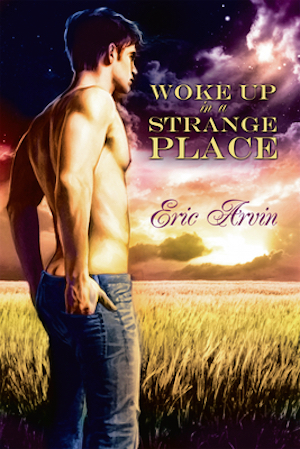
Eric Arvin was a wonderful man. Funny, kind, and oh so patient. He was taken far too soon. The world felt darker after his passing. Those who had the honor of knowing him, of loving him, were better off because of it. I miss him every day.
And man, could he write. His prose is playful when it needs to be, searing when the situation called for it. And his writing prowess is on full display in his wonderful novel Woke Up In a Strange Place. The story follows the character of Joe, who wakes up in a field of barley without any memories. Two companions—his soul guide Baker, and a familiar being called the Stranger—guide him through the mystery of why he woke up where he did. At its heart, the story is one of love, of acceptance, of searching for what was lost. Everyone should read this book, and know that Eric poured everything he had into it. I’ve rarely read an author who understood humanity as well as Eric did.
The Lovely Bones by Alice Sebold
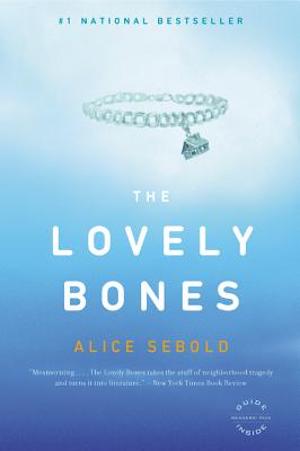
A different take on what comes next. The novel follows a girl named Susie Salmon who is murdered at the age of fourteen. She finds her heaven, but worries about those left behind: her family. Sebold’s prose is lovely and kind, even given the heavy subject matter. This novel is heartbreakingly wonderful look at the relationships between parents and their children, and what they do in order to protect each other. It’s also an unflinching look at grief, both Susie’s and her community reeling from her murder. There is a film version of this novel helmed by Peter Jackson (of Lord of the Rings fame), but to me, it loses something in the translation. In this case, the book is much, much better than the adaptation.
Taproot by Keezy Young
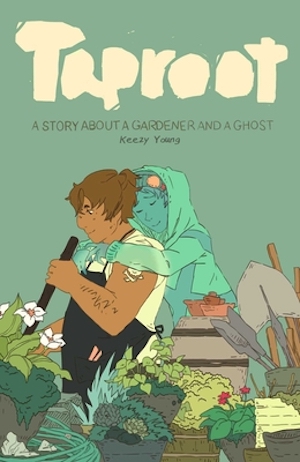
A delightful queer graphic novel about a young man named Hamal, and the ghosts he can see. One in particular, Blue, may or may not be the love of his life. While the story is wonderful in its own right, the art takes it to another level entirely. Each panel is lovingly crafted, a perfect medium for telling such a profound story of love and loss, and the lengths people will go to in order to fight for those they care about.
What Dreams May Come by Richard Matheson
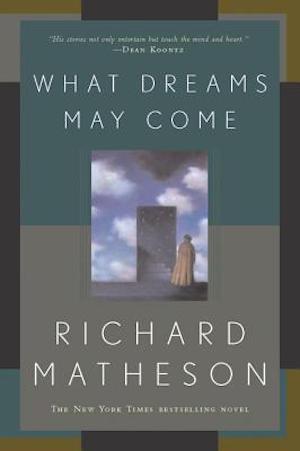
If you’ve heard of this book, chances are because it’s from the forgettable film version starring Robin Williams. While the film itself is gorgeous to look at, it—like The Lovely Bones film—loses something in translation. Though primarily known as a horror author, Matheson’s work in this story is a powerful thing. Matheson himself said that he thought What Dreams May Come was the most important book he’s ever written, saying, “It caused a number of readers to lose their fear of death—the finest tribute any writer could receive.”
The novel follows a man who dies in a car accident, and goes to a place known as Summerland, a version of Heaven where he can have and do anything he wants. In her grief, his wife dies by suicide, and is sent to a “lower realm” which is a version of Hell. What follows is a rescue mission to save her. Though some will take issue—and rightly so—with the idea that those who die by suicide aren’t destined for a Summerland of their own, Matheson writes with heart and understanding. And the ending? Perfection.
On Life After Death by Dr. Elisabeth Kubler-Ross
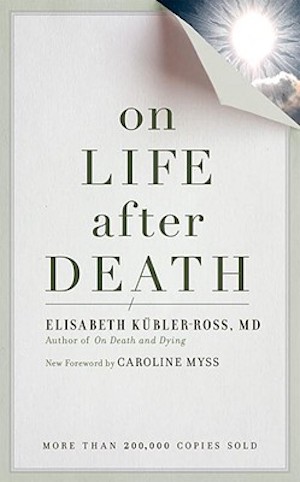
This is a work of non-fiction. If you don’t know Dr. Kubler-Ross by name, chances are you’ve heard of her work in the field of death and dying. In 1969, she introduced the Kubler-Ross model, also known as the five stages of grief: anger, denial, bargaining, depression and acceptance. Later, she would add to it, saying that it wasn’t meant to be a linear process where everyone would hit each step. Fair criticism has been levied at the model, saying that it doesn’t take into account how a person’s culture could impact the grieving process.
Dr. Kubler-Ross wasn’t the world’s greatest writer, but the four essays in this book are elevated by the subject matter: her work in hospice care dying patients, and the phenomenon of near-death experiences. While much of what she’s written here is anecdotal, it still provides a measure of comfort for those seeking it.
She writes, “Death is but a transition from life to another existence where there is no more pain and anguish. All the bitterness and disagreements will vanish, and the only thing that lives forever is love.”
Whether or not that’s true is obviously up for debate—because again, who can really know until they experience it for themselves?—it’s a lovely thought.
Buy the Book
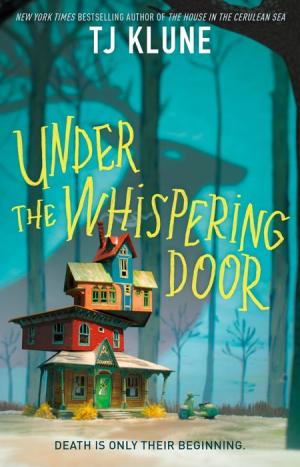

Under the Whispering Door
TJ Klune is a Lambda Literary Award-winning author (Into This River I Drown) and an ex-claims examiner for an insurance company. His novels include The House on the Cerulean Sea and The Extraordinaries. Being queer himself, TJ believes it’s important—now more than ever—to have accurate, positive, queer representation in stories.










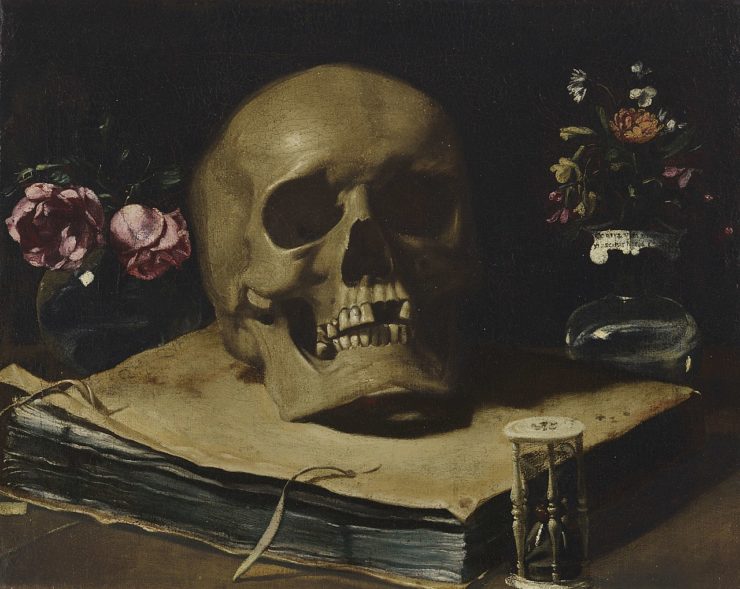
We won’t know even when we do die, if the materialists have it right. There’ll be no, “so THIS is death” moment.
Another really good one is Passage by Connie Willis. I’ve always wanted to go back and re-read it, but I haven’t ever been able to – I was so deeply moved and shaken the first time I read it, I’m not sure I want to experience that feeling again (or ruin it).
Shawn @3: I loaned my copy of Passage to someone and never got it back, so I’m glad you reminded me of it — I think I’ll get it on Kindle this time.
The C.S. Lewis re-read here just finished with The Great Divorce which is also about life after death. So is The Last Battle, of course.
I have to mention a book I love–Elsewhere, by Gabrielle Zevin. I once heard it described as a YA version of The Lovely Bones, but I think it’s completely different. A fifteen-year-old girl dies, and goes to Elsewhere, which isn’t exactly a heaven, a hell, or a limbo. Yes, you can look in on loved ones via those things you use in tourist spots to get a better view (anybody know what those are called?), but you can’t go back. I always wondered if other people loved the book the way I did, and I was happy to see it on a list of “100 Best YA Books” in Time magazine recently.
For anyone who was wondering, the things I referred to are called tower viewers. Or, apparently, binoculars.
Then again, for a somewhat less touchy-feely take, there’s always Niven and Pournelle’s Inferno, as well as Philip José Farmer’s To Your Scattered Bodies Go (the sequels to neither of these were anywhere near as good).
Reincarnation Blues by Michael Poore–read it!!!
What if you could live forever—but without your one true love? Reincarnation Blues is the story of a man who has been reincarnated nearly 10,000 times, in search of the secret to immortality so that he can be with his beloved, the incarnation of Death. Neil Gaiman meets Kurt Vonnegut in this darkly whimsical, hilariously profound, and wildly imaginative comedy of the secrets of life and love. Transporting us from ancient India to outer space to Renaissance Italy to the present day, is a journey through time, space, and the human heart
Thank you for this article, and I can’t wait to check these out. I just wanted to make a point about Matheson’s book. You mention the suicide plot point, which is only one problematic and ableist part of What Dreams May Come. You say the ending is perfection, but I would disagree on that as well. Not only does the main character tend to infantalize his wife because of her mental illness, he also implies at the end that those reborn with disabilities or chronic illnesses are being punished from their past lives/suicides. After losing someone to mental illness last year… let me tell you this novel did NOT help.
I am almost finished reading After: A Doctor Explores What Near Death Experiences Reveal About Life and Beyond by Bruce Greyson, MD, and it is truly wonderful. He has spent decades studying it from a deeply scientific perspective, and his process, results, anecdotes, conclusions and perspective are all fascinating. It’s very well written and addresses things very well, both for readers who have a faith-based view of what happens after death and for those like me who have no such beliefs.
This article put me in mind of the collection Five Fates [Laumer, Keith, Poul Anderson, Gordon Dickson, Harlan Ellison, Frank Herbert] , published in 1970. While not specifically about life after death, these stories start with a death (or not); they were quite interesting when I read them many years ago. They may or may not have aged well, of course…
The afterlife I find both the most believable and the most surprising is Ofir Touche Gafia’s The World of the End.
Many thanks for this feature. Not long ago I read a fascinating book, Sum: Forty Tales from the Afterlives, by David Eagleman (2009), a collection of linked short stories. It’s the sort of thing Borges or Cortazar might have written, and certainly one they would have liked.
Eric was just great. Wave Goodbye to Charlie is another one I really love by him and it touches some of the same subjects…
Heartbreaking is a good descriptor for Lovely Bones. I cried as I read the book. My child had started a unit on fiction and non-fiction just as I was finishing the book and was sobbing uncontrollably. They gently placed their hand on my arm and asked, “Mommy, is that book fiction or non-fiction?” I responded, “fiction.” They gently explained, “It’s ok Mommy, you can stop crying. It didn’t really happen.” After I finished Lovely Bones is when I stopped reading general fiction and mysteries for several years. I only wanted to read “unreal” things.
Surface Detail by Iain M. Banks explores a war between heaven and hell in the afterlife, where souls are digitally stored, and in which the living take sides.
Shawn @3 Oh, yes! Was trying to remember that title, but was drawing a blank.
Willis is a fantastic writer and can handle well most anything from humor to, well, Passage. I regret living so many years in Colorado and never meeting her.
“The World of the End” by Ofir Touché Gafla
https://www.amazon.com/World-End-Ofir-Touch%C3%A9-Gafla/dp/0765333570
More Than This, by Patrick Ness. At least, I think it’s about an afterlife. It broke my brain so I’m not really sure!
Passage is absolutely brilliant.
@15 And that is why I won’t read Lovely Bones! What a wonderful vignette of your child’s discovery that fiction can hurt us every bit as much as reality!
A huge recommendation from me for ‘The Five people you meet in heaven’ by Mitch Albom. It was also turned into a film, but read the book first.
Shawn @3, I came here thinking Passage would surely be on the list, and am glad it at least made it into the comments; it is one of the best afterlife exploration books I recall reading. It holds up well on rereading, or at least it did for me.
And (trying to avoid spoilers) the plot turn at perhaps just past midway through floored me. I could not believe she’d just done that. I thought maybe it was one of the author sleights of hand, and would come ‘right’ in a couple chapters, or… no. She did that, and it stayed did, and it was just brilliant.
Hannu Rajaniemi, perhas more famous for his Quantum Thief/Jean le Flambeur series, wrote a novel called Summerland, which mixes British Spiritulism, Imperialism, and the Great Game of spycraft with a strange sort of afterlife that is described explicitly as being in the fourth spatial dimension. It mixes in a smattering of an old Midrashic legend, and added some Lovecraftian horror (the green and pleasant afterlife built for privileged Britons hovers over a deep abyss which contains colossal hungry monsters).
Buddhists talk about the bardo. The place you go to between lives.
R. J. Ortega’s Summerland Rentals shows us a bardo with sports cars and swimming pools.
You can find it in the July 2010, Volume 30, issue of the Grantville Gazette.